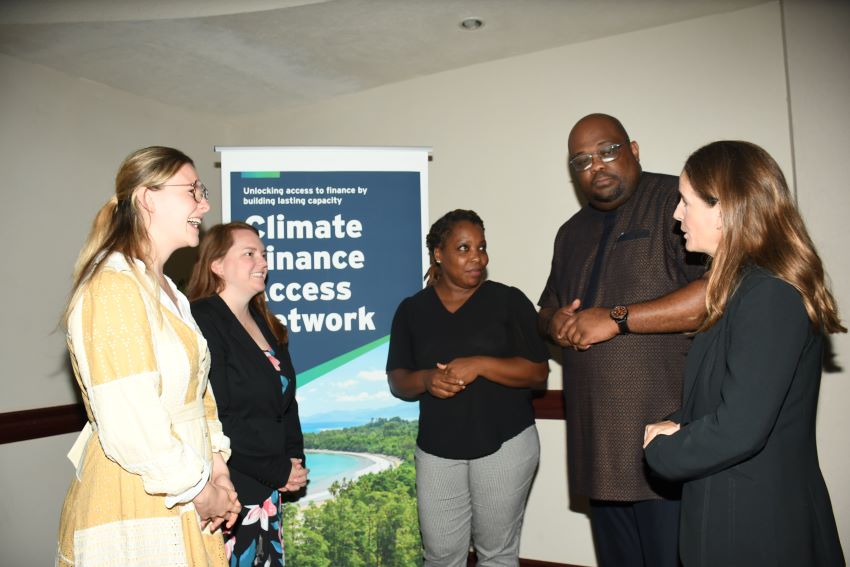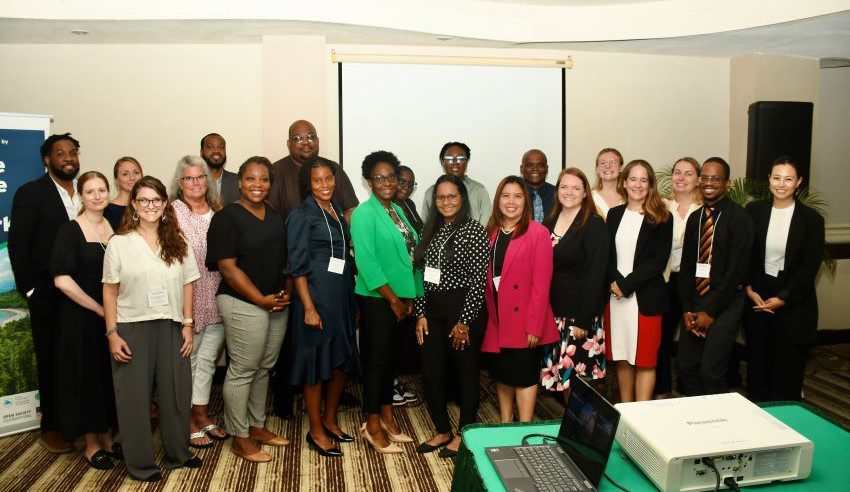
An appeal has gone out for solutions to the climate crisis to come from those in the region who are on the frontline of the crisis.
The call came from Minister in Economic Affairs and Investment, Senator Chad Blackman, as he delivered remarks at the Climate Finance Access Network (CFAN) Caribbean Workshop, at the Accra Beach Hotel, Rockley Christ Church, on Monday.
Noting that the climate crisis was going to affect everyone in the world, he said: “The time has come for the Caribbean, irrespective of jurisdiction, to see ourselves as the frontier, the thinkers of new ideas that can be exported to this world…. Climate crisis is going to affect everyone in the world, but who better to export solutions to the climate crisis than the region on the front line of that crisis?
“Therefore, the private sector working hand-in-hand with government working hand-in-hand with the academic community, must now see also research and development as part and parcel of its bread and butter moving forward, creating that space to ensure that by those solutions to the world, it also derives returns in our region backed by intellectual property”.
While applauding CFAN for organising the first-ever Caribbean Workshop, Minister Blackman said there was great significance in Barbados being chosen to host such a workshop, as it is a country which has ‘become synonymous’ with the issue of the climate crisis globally and the issue of reform finance, particularly through the Bridgetown Initiative.
“Barbados has taken significant steps to address these threats from advancing our renewable energy goals, to championing initiatives like the Blue Green Bank and the Bridgetown Initiative. Of course, the Bridgetown Initiative, which continues to gain in global traction is simply Barbados’ way of sharing with the world the idea and the ideology that the global financial architecture has to be reformed in the interest of all,” he explained.
Minister Blackman also described the Bridgetown Initiative as “an old agenda that seeks to reform global and financial architecture that support climate and vulnerable nations, by improving access to climate finance, structuring debt and mobilising private investment for sustainable development”.
“This region, the Caribbean region, is faced with significant challenges with respect to climate, with respect to finance and with respect to climate finance. We want to ensure that we can build capacity for our region to continue on a sustainable development trajectory, notwithstanding challenges that we face going forward,” he added.

Senator Blackman further told attendees that the challenges facing the region must be viewed through a global perspective, as well as in terms of local action. He emphasised that a global view is necessary, but each country must ensure that its impact is being felt ‘on the ground’.
“I want the message to go out to the world, not just to Barbados but the wider Caribbean and by extension the world, [about] the role that CFAN advisors are playing, …. We really owe a debt to you, down to the capacity that you’re helping us to build on, as you go forward.
“By embedding highly skilled advisors within our ministries, CFAN is building that local capacity necessary to develop projects that attract climate finance and enhance that necessary resilience that we all talk about,” he said.
Mr. Blackman highlighted Hurricane Beryl which started as a category four hurricane at the beginning of the hurricane season, and said it served as a stark reminder of the impact of the climate crisis. He expressed the belief that such an event suggests there is potentially a new normal being developed that requires a change in the modalities of how stakeholders engage in the treatment of the climate crisis, and also how policy makers and governments treat the issue of finance and transition, given this new normal climate crisis.
“Together, these efforts are integral to our strategy to enhance resilience and also promoting sustainable development. However, the complexity of accessing climate finance remains a substantial barrier, and this is where this initiative, plays a very critical role,” he stressed.
Mr. Blackman encouraged participants to use the workshop to fully engage with training sessions, particularly those focused on stakeholder mapping, communication, financiers and the skills necessary in advancing climate goals and objectives.
“This workshop, can either make or break the region long term, in terms of your capacity to deliver for us. This therefore, in my view, presents an ideal opportunity, not just as another workshop, not just as another opportunity to enjoy the beautiful beaches of Barbados, but to really unlock potential, not just to save our region, but to help us unleash the aspirations of our people, underscored by resilience”, he stressed.
